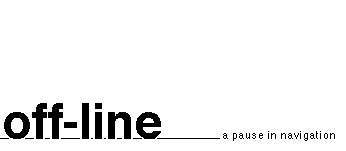Everyone is in a hurry. But it's hard to understand who
is running where – and why. Its been written and said over
and over that the network economy is about relationships,
trust, service, customer care. That the days of short-term
plans and objectives are over, the time has come to build for
the future. This isn't just a theory; it's strongly based on
facts and confirmed by experience. But what's happening is
the opposite. A lot of shallow hype, little commitment to
learning, listening and understanding. The slightest
speculative wave in the stock exchange is seen as triumph or
catastrophe. Front-page headlines tell us today that this or
that is falling apart. Tomorrow we shall read that it's the
wave of the future. Or vice versa.
Is this the "new economy"? Not really. Things
are being managed and discussed in the perspectives of old
management styles and marketing criteria – with increasing
haste, and with a staggering lack of depth. Of course some
people are making money by playing the market; but a lot of
it is just gambling. At the end of the day if someone is
gaining someone else must be losing.
"New economy" has become a catchword, that can
mean just about anything. A few months ago the cry was
"electronic commerce" and companies rushed to set
up a website without bothering to understand what it was
supposed to do for them – or for their customers. Now they
are doing more or less the same thing, except that they are
calling their sites "portals" – as if every grocer
or hardware store could (or should) suddenly become a
publisher or an internet provider. Trying to be good for
"everybody" and do "everything" is quite
silly in traditional marketing and communication; it's insane
in the internet.
Of course there is turbulence in a fast changing, fast
developing environment. But hipshooting is not the answer.
Sailing in rough and unpredictable weather can be quite
unpleasant, and dangerous, for haphazardly assembled craft or
nervous skippers. It takes a deep keel, a strong sense of
direction, dedication, a well balanced crew and clearly
shared objectives.
The ideal, of course, is to have the best of both worlds.
Speed to seize the opportunities, clear strategies to build
for the future. Of course it's possible. And it isn't as
difficult as it sounds. There is nothing mysterious or alien
about the "new economy". It's about relationships,
people, human interchange. It's about concentrating on what
each company knows best and doing it better. If we set our
priorities clearly we can have very firm strategies and all
the flexibility we need in quick and imaginative tactics.
The worst possible way to approach the new opportunities
is to be copycats. To follow the fashion, to do what everyone
else is doing. To apply the latest technology, to rush into
the most popular trend, to run with the lemmings – and get
lost in the crowd in some unfamiliar place.
There's lots of money around. There are fortunes made by
getting on the stock exchange at the right time or finding
venture capital for some apparently fashionable venture. Of
course it can be very comfortable for whoever makes a quick
gain. As Madame de Pompadour said to Luis 15th, après
nous le déluge. The next Luis was caught in the storm
and lost his head.
People with limited experience are being promoted far
above their level of incompetence – or providing service to
companies that are as confused as they are. In a fast-growing
environment even poorly planned initiatives can have a
success – for a while. And yes, growth will continue; there
will be more fortunes made by rushing around aimlessly.
But not everybody can be lucky all of the time. It's
perfectly possible to obtain good short-term results while
building gradually for the future. Some "brick and
mortar" resources are necessary in most ventures, but
adjustment to the needs and opportunities of the new economy
can be gradual and "scaleable". There has never
been any environment that is so favorable for deliberate
trial-and-error, for learning along the process, for testing
and adjusting.
The basic ingredient for fast and solid growth isn't
aimless haste. This is, indeed, a new frontier. There are,
really, great opportunities. But I think investors should be
wary of gamblers, saloon managers, fast-shooting cowboys or
bounty hunters. They should try to support the best farmers.
Those with a vision – but also with a genuine ability to
cultivate and an endless dedication to making things
grow.



